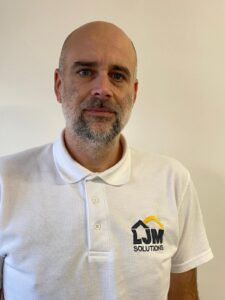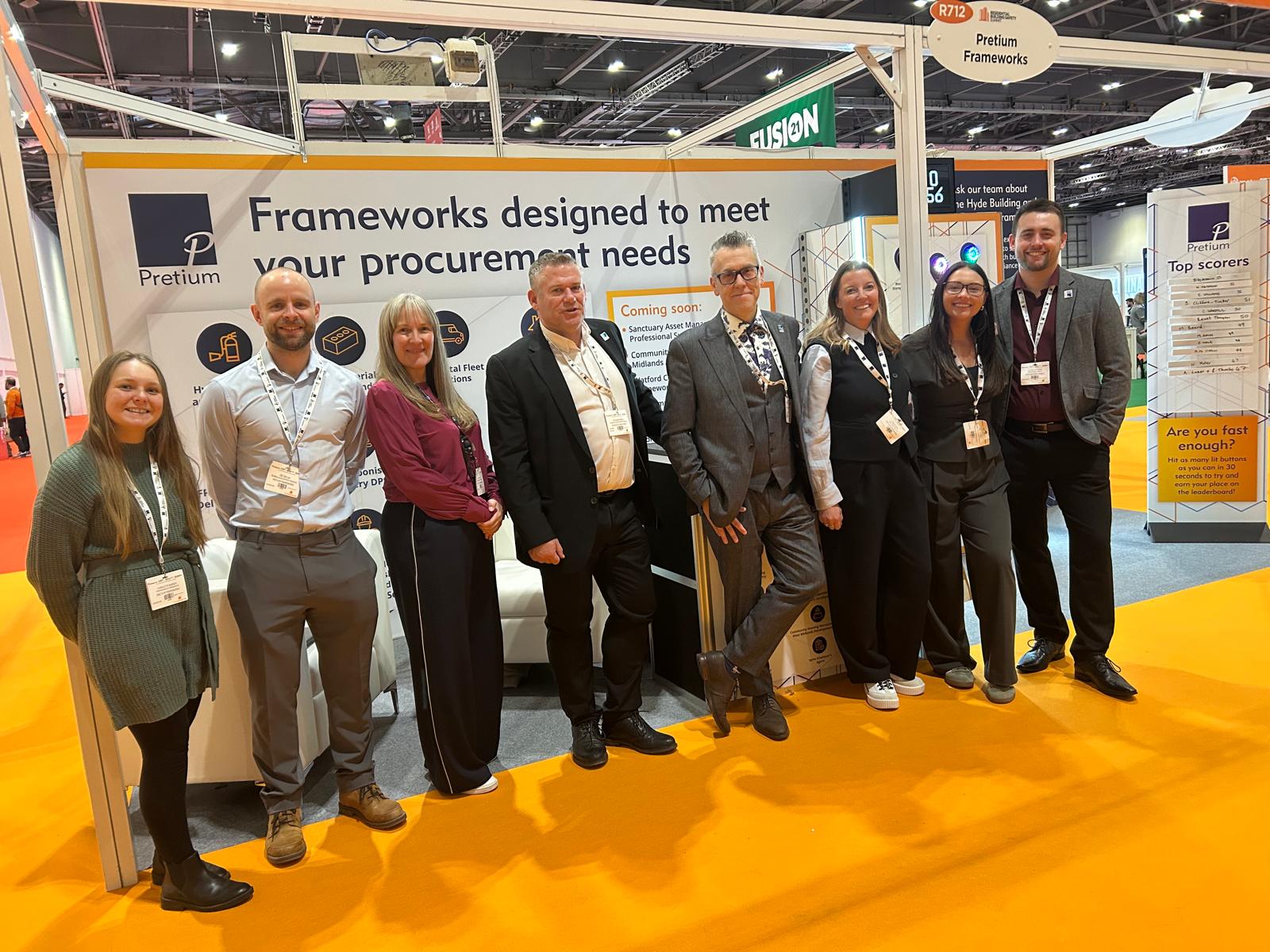Meet the Supplier: Get to know LJM Solutions
In our latest ‘Meet the Supplier’ feature, we caught up with Lee Lindley, Managing Director of LJM Solutions, supplier on the GFP Decarbonisation Delivery DPS. Lee talks about the family‑run electrical and renewable energy business’s growth from humble beginnings in a garden shed, the new product that it is developing to streamline domestic solar installations, and its plans for the next 12 months.

What is your company’s mission statement/aims/objectives?
LJM Solutions was established in May 2023 with a clear purpose: to make renewable energy accessible and affordable for homes and businesses across England. Since day one, we have prioritised strong foundations through investment in skills, training, quality management, and robust health and safety processes. Our mission is to deliver safe, high‑quality solar PV and renewable energy installations for every client we serve. We combine technical excellence with community‑centred values, ensuring each project contributes meaningfully to a more sustainable, energy‑efficient future.
Can you give us a brief history of your company?
LJM Solutions is a family‑run electrical and renewable energy business based in Long Eaton, Nottingham. Founded by Managing Director Lee Lindley and Operations Director Josh Lindley, the business is built on strong family and community values. Our electricians and solar roofing teams all come from the Nottinghamshire region, grounding us firmly in the communities we serve. What began as a small domestic electrical contractor has grown into a trusted regional provider of solar PV, battery storage, EV charging and electrical compliance services. Today, our focus is on supporting domestic and commercial clients, social housing providers and local authorities to reduce carbon emissions and achieve long‑term energy efficiency. Our growth has been driven by our reputation for quality, integrity and active contribution to social value initiatives.
What are the benefits of being a supplier on the GFP Decarbonisation Delivery DPS?
Being a supplier on the GFP Decarbonisation Delivery DPS allows us to collaborate with housing providers and councils who share our commitment to achieving net‑zero. As a fast‑growing SME, this partnership gives us the opportunity to align with like‑minded organisations and scale our impact together. The DPS offers a transparent and quality‑assured procurement route for renewable energy technologies, and it provides LJM Solutions with a platform to deliver affordable, compliant and scalable solar as well as energy‑efficiency programmes, while continuing to embed social value throughout our delivery approach.
What specific products or services does your company deliver through the DPS?
Through the DPS, we provide a full suite of renewable energy and electrical services including solar PV design and installation, battery storage systems, electrical upgrades, decarbonisation support and long‑term maintenance. All works are delivered by our directly employed, in‑house MCS‑accredited team, ensuring full compliance, detailed documentation, comprehensive handover packs and a customer‑focused experience from initial survey to commissioning.
Can you share some key achievements or successful projects completed through the DPS?
We are newly appointed to the DPS and excited to begin delivering forthcoming projects. We have been warmly welcomed into the GFP community, including at the recent Pretium Conference, where—despite being one of the smaller contractors—we have been treated as an equal partner. Beyond the DPS, our company achievements include doubling our turnover, profitability and workforce within two years, driven entirely by our commitment to quality and customer service. Our strong project management, resident engagement and technical capability have led to consistent word‑of‑mouth referrals, which remain our most powerful form of marketing.
What sets your business apart from its competitors?
LJM Solutions stands out through our family‑led values and our unwavering commitment to quality. We invest heavily in skills, training, compliance and health and safety, ensuring every installation is delivered safely and to the highest standard. Our community‑focused ethos, strong local employment approach and direct‑labour delivery model give clients full accountability, consistent quality and the added benefit of tangible social value outcomes.
How does your company contribute positively to the communities it operates in?
We contribute to local communities by employing local people, investing in apprenticeships and supporting grassroots initiatives. We are proud Apprenticeship Ambassadors—both as an employer and through representation by our staff members—and we run a schools engagement programme promoting apprenticeships and careers in the retrofit and renewable energy sector. Our leadership team also works closely with business networks, mentoring entrepreneurs and supporting female‑led SMEs around the world. Whether local to us or to our clients, we champion community empowerment at every opportunity.
What will be the key areas of focus for your business over the next 12 months.
Over the next 12 months, our priorities include expanding our solar PV and battery storage division, increasing our operational capacity and establishing regional hubs across the UK. This will enable us to engage with more local authorities and principal contractors through reliable, high‑quality delivery. We will also invest further in digital systems, automation and process refinement to strengthen consistency as we scale, ensuring we remain a trusted partner in large‑scale decarbonisation programmes.
What are the biggest challenges currently facing the housing sector?
The housing sector faces multiple challenges, particularly the prevalence of ageing stock within social housing, which results in energy inefficiency and high energy costs for residents. Combined with the pressure to meet national net‑zero targets and the ongoing skills shortage, these issues will continue to place strain on the sector. At LJM Solutions, we believe this creates an opportunity for genuine collaboration. By working together to identify replicable, scalable solutions, the industry can deliver better outcomes for residents and accelerate progress towards net‑zero.
What are the biggest challenges currently facing your company and your supply chain partners?
Our biggest challenge is managing rapid growth while maintaining the exceptionally high standards we pride ourselves on. This requires careful balancing of cash flow, recruitment and ongoing investment in skills and systems. We are fortunate to have a strong local supply chain, built on long‑standing relationships with suppliers who understand our requirements and adapt quickly as client demands increase. As a family‑run business, we view our supply chain partners as an extension of our team, and together we remain focused on delivering high‑quality solar installations and outstanding customer service.
Are there any recent innovations or developments in your business that excite you?
Yes—one of our most exciting developments is a new product currently in design, supported by the Erewash Innovation Fund. The product aims to streamline domestic solar installations, reduce labour time and support new clean‑tech manufacturing roles in Long Eaton. While details remain confidential as we explore patenting options with local universities, we are thrilled to be developing a solution that originated from solving a real client challenge. Innovation is at its best when it is practical, scalable and directly beneficial to the end user.
If you were Housing Minister for the day, what would you change?
If I were Housing Minister for the day, I would establish long‑term, stable funding programmes for decarbonisation to give providers the confidence to invest in the workforce, technology and capacity needed for delivery. I would also introduce national standards for solar PV and retrofit across social housing to ensure consistency, quality and resident protection. The energy savings alone make the case for greater government support—it is essential that funding is expanded to allow domestic and commercial clients to access the benefits of renewable technologies and contribute to the national net‑zero agenda.
Can you tell us an interesting fact about your organisation?
LJM Solutions began in a garden shed less than two years ago. Two cousins left their corporate careers to build a business grounded in integrity, family values and a desire to make a difference. Today, we are based in our third unit and have grown to a team of 14, including family members across multiple generations—right down to my mother‑in‑law! Every member of the team is local, bringing diverse skills that have shaped our continued success and helped us attract new clients while exceeding expectations.
In your opinion, what are the biggest challenges the housing sector is facing as it works to make housing more sustainable?
A significant challenge is the widening skills gap. The demand for green skills continues to grow, yet SMEs—who often hold the greatest capacity for rapid workforce development—are frequently excluded from frameworks and DPS opportunities due to their size. To achieve true sustainability, principal contractors and housing providers must work collaboratively with SMEs, enabling them to meet requirements and develop long‑term skills pipelines. There is more than enough work for everyone, and a more inclusive approach will support profitability, protect the planet and accelerate progress towards a sustainable housing sector.






